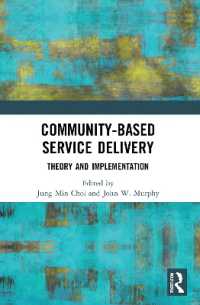Full Description
This volume examines how various forms of governance have emerged in South Asia after colonialism, and the developmental and conflict-related challenges the region faces. Drawing from the contexts of India, Sri Lanka and Nepal, it highlights the degree of institutionalization of democracy.
The book further points to the manner in which shortcomings in governmental arrangements intersect with the prevalence of conflict at the national as well as sub-national levels. It showcases that democratic and more authoritarian cultures have influenced developmental successes and failures, and reveals how (external) interventions and policy reforms in the name of development have led to diverse outcomes in different South Asian countries.
Contents
Preface
Introduction: Governance, Development and Conflict in South Asia - Siri Hettige and Eva Gerharz
I: THEORETICAL PERSPECTIVES ON DEVELOPMENT AND GOVERNANCE
'Participation' and 'Empowerment' in the Development Discourse: Rethinking Key Concepts - Ravinder Kaur and Vinod K Jairath
The Idea of Development as Governance: India in the First Decade of Independence - Dilip M Menon
II: EXPERIENCING DEVELOPMENT AND CONFLICT AT NATIONAL LEVEL
Governance and Development in Post-Independence Sri Lanka - Siri Hettige
Rituals of Democracy and Development in Nepal - David N Gellner
III: GOVERNANCE, CONFLICT AND DEVELOPMENT: EXPERIENCE AT THE GRASSROOTS
Negotiating a Dual Governance System during the Conflict in Nepal - Natalie Hicks
Empowerment of Excluded Groups: Local Democracy and Social Change in Rural Odisha, Eastern India - B B Mohanty
Between Order and Chaos: Jaffna's Local Images of Governance during Conflict - Eva Gerharz
IV: IDEAS AND INTERESTS IN GOVERNANCE AND DEVELOPMENT IN CONFLICT-RIDDEN SOCIETIES
Economic Growth to Conflict Mitigation: Changing Aid Strategies of Nepal's Donors - Acharya Laxman
Good Governance and Development in a Shrinking Local Policy Space: GATS and Service Sector Reforms - Dileepa Witharana
Glossary
Index








